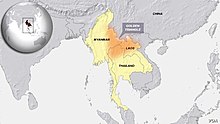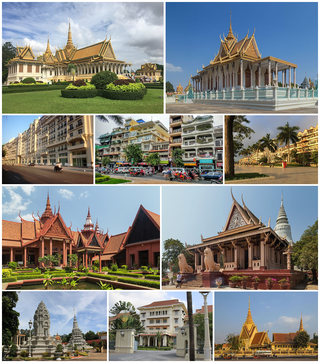
Phnom Penh is the capital and most populous city of Cambodia. It has been the national capital since the French protectorate of Cambodia and has grown to become the nation's primate city and its economic, industrial, and cultural centre.

The Mekong or Mekong River is a trans-boundary river in East Asia and Southeast Asia. It is the world's twelfth longest river and the third longest in Asia. Its estimated length is 4,909 km (3,050 mi), and it drains an area of 795,000 km2 (307,000 sq mi), discharging 475 km3 (114 cu mi) of water annually. From the Tibetan Plateau the river runs through China, Myanmar, Laos, Thailand, Cambodia, and Vietnam. The extreme seasonal variations in flow and the presence of rapids and waterfalls in the Mekong make navigation difficult. Even so, the river is a major trade route between western China and Southeast Asia.
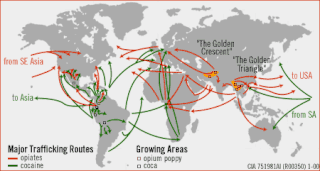
The illegal drug trade or drug trafficking is a global black market dedicated to the cultivation, manufacture, distribution and sale of prohibited drugs. Most jurisdictions prohibit trade, except under license, of many types of drugs through the use of drug prohibition laws. The think tank Global Financial Integrity's Transnational Crime and the Developing World report estimates the size of the global illicit drug market between US$426 and US$652 billion in 2014 alone. With a world GDP of US$78 trillion in the same year, the illegal drug trade may be estimated as nearly 1% of total global trade. Consumption of illegal drugs is widespread globally and it remains very difficult for local authorities to thwart its popularity.

The Golden Crescent is the name given to one of Asia's two principal areas of illicit opium production. Located at the crossroads of Central, South, and Western Asia, this space covers the mountainous peripheries of Afghanistan and Pakistan, extending into eastern Iran.

The Golden Triangle is the area where the borders of Thailand, Laos, and Myanmar meet at the confluence of the Ruak and Mekong rivers. The name "Golden Triangle"—coined by the CIA—is commonly used more broadly to refer to an area of approximately 950,000 square kilometres (367,000 sq mi) that overlaps the mountains of the three adjacent countries.
Ya ba, formerly known as yama, also known as "bikers' coffee" and "kamikaze", are tablets containing a mixture of methamphetamine and caffeine. This drug combination has been widely used illicitly, especially in Southeast Asian nations.
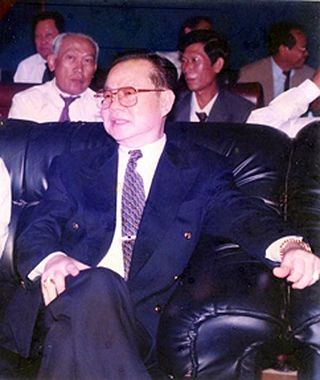
Teng Bunma, also written as Teng Boonma, Theng Boonma, and Theng Bunma, was one of the wealthiest businessmen in Cambodia. He was one the founders of Thai Boon Roong Group and, along with Sok Kong and Meng Retthy, he was well known as one of the “four tigers” of the Cambodian economy after the fall of the Khmer Rouge, between the 1980s-2000s.
Comin Asia is an engineering company and general contractor based in Cambodia, Vietnam, Thailand, Laos, and Myanmar. Comin participates in major construction and improvement projects in Southeast Asia and the Mekong River area, including hotels, factories, infrastructure projects, power plants, network security and automation, and office buildings.
The illegal drug trade in China is influenced by factors such as history, location, size, population, and current economic conditions. China has one-fifth of the world's population and a large and expanding economy. China's large land mass, close proximity to the Golden Triangle, Golden Crescent, and numerous coastal cities with large and modern port facilities make it an attractive transit center for drug traffickers. Opium has played an important role in the country's history since before the First and Second Opium Wars in the mid-19th century.

The ancient Funan sites of Angkor Borei and Phnom Da are located in the Angkor Borei District, Takéo Province, of southern Cambodia. It is in southern part of Cambodia, about 10 kilometers from the western split of Mekong river delta, 150 kilometers from the seacoast, and near the Vietnam border. The Angkor Borei site was an early capital and a region where southeast Asian culture and arts fused in the ancient times. Archaeological excavations have yielded items that are carbon dated to roughly 400 BC and thereafter, many related to early Buddhism and Hinduism, confirming a continuous human settlement at least for some 2,500 years. They contain the earliest known dated Khmer inscriptions as well as the earliest tradition of Khmer sculpture.
The ASEAN Wildlife Enforcement Network (ASEAN-WEN) was officially launched on 1 December 2005, as a regional inter-agency and inter-governmental initiative to counter the illegal cross-border trade in endangered flora and fauna. It helps countries share information on and tackle cross-border wildlife crime and facilitates the exchange of regional best practices in combating those crimes. As the world's largest wildlife law enforcement network, it comprises the law enforcement agencies of the 10 ASEAN countries forming a regional intergovernmental law-enforcement network.
Drug precursors, also referred to as precursor chemicals or simply precursors, are substances which are known to be used in the illegal manufacture of illicit drugs. Most precursors also have legitimate commercial uses and are legally used in a wide variety of industrial processes and consumer products, such as medicines, flavourings, and fragrances.

The Mekong River massacre occurred on the morning of 5 October 2011, when two Chinese cargo ships were attacked on a stretch of the Mekong River in the Golden Triangle region on the borders of Myanmar (Burma) and Thailand. All 13 crew members on the two ships were killed and dumped in the river. It was the deadliest attack on Chinese nationals abroad in modern times. In response, China temporarily suspended shipping on the Mekong, and reached an agreement with Myanmar, Thailand and Laos to jointly patrol the river. The event was also the impetus for the Naypyidaw Declaration and other anti-drug cooperation efforts in the region. On 28 October 2011, Thai authorities arrested nine Pha Muang Task Force soldiers, who subsequently "disappeared from the justice system". Drug lord Naw Kham and three subordinates were eventually tried and executed by the Chinese government for their roles in the massacre.

Opium production in Myanmar has historically been a major contributor to the country's gross domestic product (GDP). Myanmar is the world's second-largest producer of opium after Afghanistan, producing some 25% of the world's opium, and forms part of the Golden Triangle. The opium industry was a monopoly during colonial times and has since been illegally tolerated, encouraged and informally taxed by corrupt officials in the Tatmadaw, Myanmar Police Force and rebel fighters, primarily as the basis for heroin manufacture. While opium poppy cultivation in Myanmar had declined year-on-year since 2015, cultivation area increased by 33% totalling 40,100 hectares alongside an 88% increase in yield potential to 790 metric tonnes in 2022 according to latest data from the United Nations Office on Drugs and Crime (UNODC) Myanmar Opium Survey 2022 With that said, the United Nations Office on Drugs and Crime (UNODC) has also warned that opium production in Myanmar may rise again if the economic crunch brought on by COVID-19 and the country's February 1 military coup persists, with significant public health and security consequences for much of Asia.
Cannabis in Cambodia is illegal. This prohibition is enforced opportunistically. Many "Happy" restaurants located in Phnom Penh, Siem Reap and Sihanoukville publicly offer food cooked with marijuana, or as a side garnish.
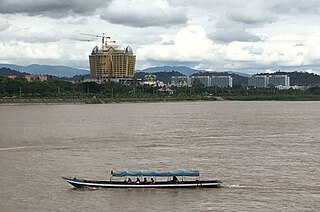
The Golden Triangle Special Economic Zone is located along the Mekong River in the Ton Pheung District of Bokeo Province in Laos. The zone has an area about 3,000 hectares and was created in 2007 by the Lao government together with the Chinese-owned Hong Kong-registered company Kings Romans Group with the hope of generating economic development.
East African drug trade refers to the sale and trafficking of illegal drugs that take place in East African countries like Kenya, Tanzania, Uganda, Somalia, and Ethiopia. The most prevalent types of drugs traded in East Africa are heroin, marijuana, cocaine, methamphetamine, and khat, all of which are strictly prohibited in East African countries.
The illegal drug trade in Japan has a long history, influenced by various factors such as economy and war. As a developed country in Asia, Japan also faces the same serious drug abuse problem as the developed countries in Europe and the Americas. Japan's manufacturing industry is developed, and is one of the pillars of the national economy, but it is also very short of resources, therefore it needs to import a lot of raw materials from other countries. This has made Japan an important hub for the trade of goods in Asia, which in turn has allowed Japan's illegal drug trade to flourish.
Maritime drug smuggling into Australia refers to the smuggling of illicit drugs into Australia by sea. While much contemporary Australian media coverage has focused on smaller, more personalised smuggling cases such as the Bali Nine, maritime drug smuggling often allows criminal groups to move illicit drugs and substances into Australia at a much greater scale. This has happened through a variety of ways, including via cargo ship, yacht, and fishing vessels. Key departure locations for drugs aimed to be smuggled into Australia include China, India, Southeast Asia, and the Americas, with much of the drugs trafficked via countries and territories in the South Pacific, in close proximity to Australia.
Zhao Wei is a Chinese gangster and the founder of Hong Kong-registered company Kings Romans Group, which owns the Kings Romans casino franchise. The United States Treasury Department imposed sanctions on the Zhao Wei Transnational Criminal Organization in 2018 for its involvement in laundering money and assisting in the storage and distribution of heroin, methamphetamine, and other narcotics for illicit networks, including the United Wa State Army which operates in Myanmar. Based in Laos in the Golden Triangle Special Economic Zone (GTSEZ), Zhao Wei is also reported to engage in human trafficking, bribery, wildlife trafficking, and other forms of transnational organized crime. Much of this illicit activity is conducted through the Kings Romans casino organisation in the GTSEZ.
